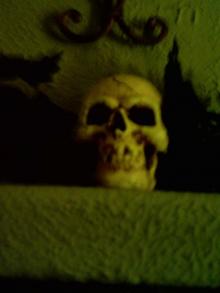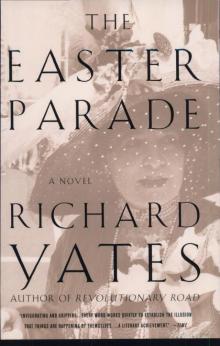- Home
- Richard Yates
A Good School Page 6
A Good School Read online
Page 6
Haskell hadn’t expected such a clear-cut suggestion. After a moment, smiling vaguely as he paced, he said “Ah, yes, Hughie; if only it were that simple.”
The office was in an upstairs section of Four building, well away from the kitchen help’s quarters, and it looked as much like a real newspaper office as Haskell could make it. There were two paper-strewn typewriter desks, and there was a hotplate and a coffee percolator with several chipped mugs. Haskell drank more coffee than he wanted, especially on deadline days; often, when the door was locked and the windows open, he and Britt smoked cigarettes here too.
Haskell took up a slumped, staring posture at the windows, his homely features set in the look of someone for whom one crisis is never enough. “And on top of everything else,” he said, “we now have Grove to contend with.”
“I don’t know why you say ‘contend,’ John.”
“Because he’ll be around our necks, that’s why. We’ll be contending with his funny face and his dirty clothes and his awful fingernails, and we’ll spend all our time just keeping him down. He was up here sucking around and sucking around all afternoon.”
“You’re making too much of it,” Britt said, shifting uncomfortably in his chair. Haskell was his best friend, but there were times when he got on his nerves. Tonight Haskell had brought him up here after study hall, apparently for no other purpose than to dramatize himself. Another thing: Britt wished Haskell would quit calling him “Hughie.”
“Shall I put some coffee on?” Haskell inquired.
“No, thanks; I want to get on back.”
“What for? There’s plenty of time.”
“I want to get on back, that’s all.” And Britt stood up. “John?” he said. “You coming or staying?”
“My goodness,” Haskell said, “how abrupt we are this evening.”
They didn’t talk on their way back to Three building, and it wasn’t a companionable silence. Britt walked with a hard ringing of his heels on the flagstones, holding his big shoulders square and tight, wondering how he could possibly admire anyone who said things like “My goodness, how abrupt we are this evening.”
They knew something was up as soon as they’d reached the second floor, and they could sense it was something bad. Both ends of the hall were unnaturally quiet. Boys stood in clusters, near and far, their mouths partly open, and they were all staring at the closed door of Henry Weaver’s room. Ordinarily, nobody paid much attention to Henry Weaver; it wouldn’t have been hard to forget he existed. He was big and muscular and mild, a good soccer player, a pleasant, smiling fellow who had no friends.
“Weaver’s got a little kid in there with him,” somebody said. “Little kid from Two building.”
Then Pete Giroux went up with a bar of soap in his hand and wrote “HOMO” across Weaver’s door. All the dormitory doors were made of dark wood, finely and deeply grooved; it would be impossible to wash the lettering out of those grooves. A plainly legible ghost of it would be there next year, when somebody else moved into the room; it would be there forever, unless workmen came and replaced the door.
“Come on outa there, Weaver,” Pete Giroux called like a cop in the movies, “or we’re coming inta get ya.” Another boy was crouched and working with a jackknife at the wooden bolt of the door.
It opened suddenly and very briefly, just enough to let the little kid out into the hall. He stood there blinking in his rumpled dinner clothes, trying to look as if he didn’t know what this was all about. He was twelve or thirteen. Haskell, who knew the names and faces of everyone in school from his work on the Chronicle, identified him as Dwight Reeves of the first form.
“Arright,” Giroux told him, “getcher ass outa here, punk. Fast.”
Then they concentrated on “getting” Henry Weaver, though there was no clear plan for what to do when they got him. The jackknife couldn’t pick the bolt open when Weaver’s hands were holding it shut, so they fell back on other tactics. Somebody came from the shower room with a water-filled condom and shoved the bulging, wobbling thing over the transom into Weaver’s room, where it fell and burst with a heavy splash. Soon a chant went up from the crowd, quietly at first and then louder: “Ho-mo; ho-mo; ho-mo . . .”
Weaver was evidently trying to outlast them, to stick it out until Lights, when they’d all have to disperse, and he might have made it except that Steve MacKenzie came strolling lazily into the hall and said “What the hell’s going on?” When he’d heard the news he went up very close to Weaver’s door and said “Weaver? I guess you know that if I report this you’ll be expelled tomorrow. Now. I want you to come on out of there.”
And Weaver came out. He looked terrible, and the worst part was that he was smiling.
Pete Giroux took the scruff of his neck in one hand and the seat of his pants in the other; they frog-marched him down to the shower room, pushed him fully dressed into a cold shower and held him there for a long time. He smiled under the water, too, and all the way back to his room, where he closed and bolted his door again.
“And so ends another night of fun and frolic in the dorm,” Haskell said to Britt, who wasn’t listening.
Two new boys had come to the second floor of Three building in January, and by now it was clear how they were turning out. One of them, Jim Pomeroy, was small and trim and athletic, so it had been assumed at once that he’d be a neat companion for Terry Flynn. Pomeroy was in the fourth form, as befitted his age, but apart from that he and Flynn seemed to have everything in common. They even looked something alike, except that Flynn was blond and Pomeroy dark. Pomeroy had muscle definition too. On spring afternoons they would jog and sprint around the big lawn in front of One building until dusk, expertly and gracefully passing a football back and forth, two peppy little Irish-American guys without a care in the world. It soon developed too that Pomeroy was “sophisticated” – he knew a lot about girls and could talk about them without seeming to boast. This might tend to make some of his listeners withdraw in an envious, embarrassed silence after a while, but it went over very well with others, and especially with Steve MacKenzie: there was nothing MacKenzie liked better than talking about girls. Almost every night, after Lights and after Mr. Driscoll’s rounds, he and several others would drop into Pomeroy’s or Flynn’s room, and the sounds of their murmuring and lewd laughter would float down the hall for hours.
The other new boy was tall and slim with a strikingly handsome face, a bad complexion, and the unfortunate name of Pierre Van Loon. From the very beginning he’d made the mistake of talking too much, and the further mistake of talking about boring things: he would tell in painstaking detail the plots of rocket-ship stories from Astounding Science Fiction magazine, or relate with wonderment his father’s adventures as an artillery officer in the First World War. At other times he could be found in one of the toilet stalls with his pants around his ankles, sitting much longer than necessary in the smell of his own excrement and wholly absorbed in a comic-book.
Pierre Van Loon tried hanging around with Lear and Jennings for a while until they grew impatient with him, then he drifted down among the less popular; he might even have tried Henry Weaver, except that he’d been present on the night of Weaver’s humiliation. Eventually he settled on Grove.
“I’m doing a little better, don’t you think?” he said in Grove’s room one afternoon. “I mean I still do dumb things and everything, but I don’t do anything quite as dumb as when I first got here.”
“Well,” Grove said kindly, “it takes a little time.”
“Like, did I tell you about the first time I met Mr. Draper? I’d only been here about a week, and I don’t take chemistry, you see, that’s the thing. If I took chemistry, I’d have known him. Anyway, he came walking toward me in the whaddya callit, the quadrangle, and he was sort of smiling at me – that’s the thing; if he hadn’t been smiling I wouldn’t have said it – so I smiled right back and I said ‘What’s the matter, sir, got a stone in your shoe?’”
“Oh. So what
did he say?”
“Oh, he was very nice about it; he just said ‘No, I’ve had polio.’ And then of course I spent about half an hour apologizing, and he kept saying it was all right, but still. Boy. Wow. Jesus.”
“Well, those things happen.”
“What’ve you got there, Grove? Is that English or history?”
“Just something for the Chronicle.”
“Oh, yeah? You really put in a lot of work on that, don’t you. Know something? That’s something I’d like to do too.”
“Well, you’d have to wait till next year now; then you could sign up for it.”
“I see. Well, I wouldn’t want to do the serious stuff or anything, but I could do the funny stuff. You going someplace?”
“Just to take this over to Haskell.”
“Mind if I come along?”
“Well,” Grove said, “the thing is I have to talk to Haskell about this, you see.” And he got out of there fast, before Van Loon could say anything else. Even for a chronic loser like William Grove, some guys were a little hard to take.
The door of the Chronicle office was locked; he had to knock and announce his name before being allowed inside, where Haskell and Britt were smoking cigarettes.
“Well, Willie Grove,” Haskell said. “What’ve you brought us this time?” He took Grove’s manuscript and dropped it on the desk after a cursory glance; then he went on pacing the floor. He was wearing his suit coat like a cloak, the empty sleeves dangling. “Sit down, Grove,” he said. “We’re in a mood of celebration today. A sad day in some ways, but essentially a day of brave beginnings. Our leader has stepped aside.”
“Oh?” Grove said. “So does that mean you’re the editor now?”
“It does indeed. There won’t be any formal announcement, of course, but for anyone who’s interested the old masthead will carry the news in our very next issue. And our good friend Hughie here is now managing editor. I only hope he enjoys it more than I did.”
“Well, that’s – good,” Grove said. “Congratulations.”
“Ah, Willie. I knew I could count on you to say precisely the right thing. Cigarette?”
Grove had smoked two cigarettes in his life, and they’d both made him sick. “No, thanks,” he said, and hoped Haskell wouldn’t press him.
“I’ve been meaning to tell you, Grove,” Haskell said, “how much we’ve enjoyed your stories. They’ve needed scarcely any work at all. Also, I’m delighted that you’ve cut and cleaned your fingernails. You’re almost human now.”
“Hey, John?” Britt said. “Where’d you get this phony way of talking, anyway? All this plum-in-your-mouth stuff ? Because I mean it’s really getting to be a pain in the ass.”
“Is this a faculty meeting, or what?” Myra Stone inquired of her husband as he prepared to leave the house.
“No,” he said, “just something I want to see Knoedler about.”
“Can’t you even tell me what it is?”
“Well, I think I’d rather not, dear. It’s about one of the boys, and you’re friendly with a good many of them.”
“Oh, Edgar, honestly. You and your secrets. You make me so tired.”
“You make me tired, too, Myra, but somehow we get along.”
She followed him as far as the front door. “Will you be back by five? Because Edith said she’d call at five. Don’t you even care about your daughter?”
“All I care about is myself,” he said. “Everybody knows that.”
“Think you’re so funny, don’t you. Well, you’re not funny at all. You’re remote and you’re distant and you’re cold. You’re cold.”
When he’d gone she walked the floor for a long time with one hand at her forehead. She might have cried, except that it almost never occurred to her to cry when she was alone.
“Sorry to drop in on you this way, uh, Alcott,” Stone said.
“Not at all. A little sherry?”
“No, thanks.”
And as he closed the sherry cupboard Knoedler tried to compose a sentence in his mind: If it’s a question of money, Edgar, there’s no reason why we can’t get together on a satisfactory . . . The trouble with such a sentence was that it wouldn’t be true. Stone was the highest-paid man on the staff, and any further raise would break the bank. Still, they couldn’t afford to lose him: he was their only Harvard graduate and one of their only two Ph.D.s.
“It’s about one of the boys,” Stone began, and Knoedler felt his lungs loosen in relief. “It’s Haskell, in the fourth form. I think he may be heading for some sort of nervous or emotional – well, these things aren’t easy to assess, but he shows signs of being disturbed.”
“Mm,” Knoedler said. “Well, the last time Haskell’s name came up, I remember you described him as brilliant.”
“I don’t think I said that, Alcott. I think I said precocious. He’s always tended to show off in class – he doesn’t just talk, he holds forth – but lately he’s begun holding forth in a very elevated style, and sometimes I can’t make sense of it. And it’s the same in his written work, pages on pages. I tried to have a talk with him after class today, and I couldn’t seem to hold his attention.”
Knoedler was nodding slowly and steadily to show that he understood. “Well,” he said at last, “I know John’s been under pressure from overwork on the school paper, and then of course he’s always been a high-strung boy and something of an eccentric; there’s a rather bizarre family situation, and so on. In any case—”
“Bizarre in what way?”
“Well, the parents were divorced long ago; the mother’s since been married and divorced two or possibly three more times; she now lives with a young man who runs a riding stable over here in Glastonbury. But the point is a good many of the boys come from troubled homes, Edgar, as I’m sure you know, and we have to allow a certain leeway in our – our judgments.”
“I didn’t mean to be making a judgment, Alcott,” Stone said. “I simply meant – well, for one thing I wanted to ask if the infirmary has access to a psychiatrist.”
“Oh, I expect something of that sort could be arranged if necessary, yes,” Knoedler said, but he was beginning to be impatient. This, after all, was Edgar Stone’s first year here. New masters often tended to expect a schoolful of frightened little conformists; it took a while to understand Dorset Academy. “In any case I’m glad you stopped by, Edgar,” he said. “I’ll have a talk with him tomorrow.”
That evening at dinner, for the first time, William Grove found himself sitting with Haskell and Britt and being included in their talk. He could scarcely believe it.
“. . . Christianity doesn’t begin to answer the needs of this century,” Haskell said, while Britt nodded in agreement over a forkful of succotash, and Grove quickly saw an opening.
“That’s why we have Marx and Freud, I guess,” he said, not at all sure that it wasn’t something he’d read in Time magazine.
“Exactly,” Haskell said. “And very well put, Grove. Because if Marx and Freud hadn’t existed, we’d have invented them. What’s more, we’d . . .”
That was the only time Haskell said “very well put, Grove,” but the talk went happily on long after they’d left the refectory, and Grove remained a part of it. The three of them strolled around the quadrangle until time for study hall, talking and talking, making occasional sweeping gestures with their arms. Haskell had abandoned Christianity now and moved down into popular culture. The function of the movies, he explained, was to help people hide from reality.
“Oh, I don’t know,” Grove said, because it seemed important to disagree sometimes. “What about a movie like The Grapes of Wrath?”
“That’s an evasion of reality too, don’t you see? When everything’s tied up in a neat little dramatic package, you can forget it the minute you walk out of the theater.”
“So what do you want, John?” Hugh Britt said. “You want everybody to go out and be migrant workers or Russian revolutionaries or something?”
“I want p
eople to feel,” Haskell told him. “I want people to experience life.”
All the next day, even through his afternoon of jolting around in the truck, Grove went over and over the talk in his mind. He had said three or possibly four smart things, and might have said more except that he’d had the sense to keep quiet when Haskell went off on one of his long speeches, or when Haskell and Britt were bickering. There had been two or three times too when he’d screwed-up and said something dumb, but lapses like that would be easy to correct in future dinners and strolls.
He was getting dressed for dinner that night when Britt came to his room and said “Grove? Can I come in? Can I shut the door?”
And Britt sat on Grove’s chair, looking trim and spruce as he always did in his evening clothes. “Listen,” he said. “Haskell’s cracking up. I’ve seen it coming for a long time; maybe you have too. Anyway, Knoedler called him into the office today, and when he came out he could hardly wait to tell me about it. Or I guess he wanted to tell me, but I couldn’t make head or tail out of it. All very emotional and overwrought. He told me he’d said to Knoedler, ‘Sir, before you go any further I want you to know that I love this school.’ I said ‘What’d you say that for, John? You don’t “love” the school, do you?’ And then he told me he cried – sat there crying in front of Old Bottle-ass – and he damn near cried again just telling me about it. I said ‘What’d you cry for?’ And all he gave me was more of this convoluted bullshit. Well, if he’s sick, let him go to a hospital. And whether he’s sick or not, I’ve had enough. So listen, Grove: let’s steer clear of him tonight, okay? I don’t know about you, but I’m fed up with being his psychiatrist, or his mother, or whatever the hell it is he wants me to be.”
They couldn’t steer clear of him at dinner because he sat down with them, but he was silent throughout the meal. It was a dramatic silence, giving every sign of wanting to call attention to itself. Whenever they glanced at him they found his face set in a haggard look, or in a despairing little smile, and so they tried not to glance at him at all.

 The Collected Stories
The Collected Stories A Special Providence
A Special Providence Young Hearts Crying
Young Hearts Crying Easter Parade
Easter Parade A Good School
A Good School Cold Spring Harbor
Cold Spring Harbor Eleven Kinds of Loneliness
Eleven Kinds of Loneliness Disturbing the Peace
Disturbing the Peace Liars in Love
Liars in Love The Collected Stories of Richard Yates
The Collected Stories of Richard Yates Night Noises
Night Noises Disturbing the Peace (Vintage Classics)
Disturbing the Peace (Vintage Classics) The Easter Parade
The Easter Parade